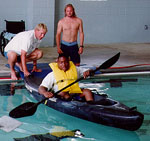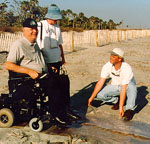Anchors Away still afloat for people with disabilities
by Katharine HendrixSpecial to The Catalyst
A little more than a year ago the financial picture looked so grim that Dave Sewell was braced to grieve the coming loss.
Anchors Away, a recreational program for people with disabilities had been his heart and soul for four years. Now Sewell, director and self-described chief deck-hand, realized that without a miracle the program was going to sink into the swamp of history. MUSC’s Department of Physical Medicine and Rehabilitation, which had sponsored the program since it began in 1994, was being dismantled in a round of cuts leaving Sewell scrambling for enough funds to stay afloat.
After meetings, phone calls, pleas, and prayers the miracle showed up in the form of David Griesemer, M.D., chairman of MUSC’s Department of Neurology. Griesemer had seen his own patients benefit from participating in Anchors Away and believed so strongly in it that he brought it on board as a departmental project.
 Dave
Sewell helps participants learn to kayak in a pool before hitting the open
water.
Dave
Sewell helps participants learn to kayak in a pool before hitting the open
water.
Anchors Away began as a grant-funded water-sports activity program to help rehabilitate people after strokes and spinal cord injuries. In its seventh year the program has expanded, offering adaptive water activities for people with all physical and mental disabilities. Anchors Away also arranges outings for the elderly, economically disadvantaged, or otherwise isolated people who would benefit from a day trip out on the water.
Through the years, Sewell estimates Anchors Away has taken hundreds of students from Charleston County special needs classes plus countless individual clients out on the water. Five years ago Sewell was joined by Andrew Ewing, a championship disabled water-skier who leads all clinics provided by Anchors Away and organizes funding each year through the Ewing Foundation.
Using specially designed equipment, Anchors Away staff and volunteers teach water activities to people with all sorts of mobility limits including those who are completely paralyzed.
Water skis are fitted with seats and tow-rope holders allowing people to steer by shifting their weight. Jet skis are perfect for taking a physically challenged person out riding as they can be supported by other riders on the same machine. A wide variety of poles and gear make fishing possible for everyone. People who may only have use of their mouths can use poles fitted with mouth-switch reels.
The program also provides learning opportunities for MUSC students,
particularly those in physical rehabilitation who, through the program,
come to better understand their patients’ lives. They go out with
Anchors Away and each draws a physical challenge from a hat and learns
to water-ski, kayak, sail, or fish with that disability.
Sewell feels it’s important to include family and friends in
all Anchors Away activities not only to provide an opportunity for them
to have fun together but also to overcome assumptions about the limitations
of the person with special needs.
 Anchors
Away takes MUSC retired faculty member, Clint Miller, to Dewees Island
so he can participate in his first outing with his bird-watching club.
Anchors
Away takes MUSC retired faculty member, Clint Miller, to Dewees Island
so he can participate in his first outing with his bird-watching club.
“We encourage all of our clients to bring their social support network on the trip. We provide peer role models, other people with disabilities, for social support as well as able-bodied volunteers who come along. We’re not just a boat full of wheelchairs. We’re a boat full of people having fun,” Sewell said.
The benefits of participation are greater than just learning a recreational sport, he adds. “I’ve seen the experiences people have with us out on the water translate into employment and social interaction. People get more self-esteem, confidence, and independence plus greater mobility.”
Bill Horn, Anchors Away’s volunteer coordinator, makes this point more directly: “My favorite part of the program is that when everyone is in the water with a life vest on, you can’t tell who’s disabled and who’s not. (A friend) met Drew (Ewing) several times and didn’t even know he was paralyzed because he’d only seen him in the water.”
Griesemer’s perspective is that the Anchors Away program fills an important gap in the health care system. “We so often emphasis acute medical care that we forget about the other important needs. We handle the early parts (of patient care) well, but when we reach the end of what the medical model should do, people aren’t ready to go back to normal life.”
Griesemer sees the program as providing adaptive rehabilitation to help people with disabilities really begin building quality of life.
“This is a well-run program with a national reputation that enjoys enthusiastic community support. As MUSC considers its vision of the future, we’ve got to realize that with an aging population the increased rehab needs, there will be an even greater need for programs like Anchors Away. It’s really a flagship project for meeting adaptive rehab needs now.”
“I can’t thank Dr. Griesemer enough,” Sewell said. “He pulled us out of the dump and gave us a chance to raise our own funds and make it.”
Anchors Away is currently funded by a patchwork of grants, private donations, and trained volunteers. Although financially sound for the time being, both Sewell and Griesemer point out that raising money is always a challenge.
“I vowed when things were so tight to work really hard not to spend any money for things we could do ourselves or get donated. We need about $150,000 a year and boat maintenance is definitely the biggest single expense,” Sewell said. “I really am thankful for our sponsors. Luke’s Kawasaki gives us a couple of jet skis to use each year, The City Marina provides slips to park the boats, Summerville Marine and Key West Boats completely re-fitted our biggest boat for handicapped access, the Department of Natural Resources donates boat storage, and, of course, MUSC provides a lot of administrative support, insurance coverage, and covers our van. Some others are the Molly Bee Fund, Charleston Community Foundation, Exchange Club of Charleston, and Diversified Metal Technologies. Really, there are so many supporters, we haven’t done this ourselves, we’re just facilitating something that the community wants.”
Anchors Away takes donations of boating gear like life jackets, oars, gas tanks, and recreational equipment from fishing gear to kayaks and floats. To volunteer, make a donation, or arrange an outing call 792-0721.
All donations are tax deductible.